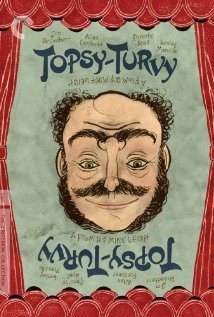“Three Little Maids & a Wandering Minstrel”

| None | Light | Moderate | Heavy | |
|---|---|---|---|---|
| Language | ||||
| Violence | ||||
| Sex | ||||
| Nudity |
What You Need To Know:
TOPSY-TURVY is a British movie telling how Gilbert & Sullivan created their famous comic opera, THE MIKADO, in 1885. At first, Sullivan, who’s somewhat of a sexual libertine according to the movie, does not want to collaborate any more with the gruff Gilbert. When a Japanese cultural exposition, however, inspires Gilbert to conceive the story behind THE MIKADO, Sullivan also becomes inspired to create some of his most famous music, including the songs “Three Little Maids” and “A Wandering Minstrel I.”
When TOPSY-TURVY concentrates on the professional relations between Gilbert and Sullivan and their theater troupe, or on the making and performing of THE MIKADO, the movie is quite entertaining, though a bit slow. When, however, the movie briefly reveals the dark undercurrents of the characters’ lives, it is much less successful. Included among the more objectionable moments are short scenes implying voyeurism, marital woes, lesbian desires, and abortion and an early brief scene where half-naked prostitutes cavort and embrace in Paris. Cutting out most, if not all, of such material would not only make this 160-minute movie more moral and historically accurate, but also more entertaining and better paced
Content:
(H, Pa, RHRH, AB, O, B, Ho, L, V, SS, NN, A, DD, M) Amoral humanist worldview of the selfish professional lives behind two famous artists of the London stage, Gilbert & Sullivan, plus some historical revisionism, immorality, scenes of play featuring an occult sorcerer, & a much too subtle moral lesson about living & working in harmony; 5 mostly mild obscenities including 1 “f” word plus 1 profanity (“for God’s sake”); very mild violence such as man brandishes samurai sword in pretend fight, man pushes wild woman away & woman talks of bizarre play where husband strangles wife to death; implied fornication, brief early scene where half-naked prostitutes cavort & embrace, much to voyeuristic delight of wealthy man, homosexual embrace between female prostitutes, vaguely implied lesbian desires & effeminate male actors, plus clothed man hops on top of clothed woman on couch & indirect references to abortion & latent lesbian desires; upper female nudity in sexual, voyeuristic context & woman seems overly interested in looking at other women’s naked thigh & underwear in dressing room; alcohol use; smoking & implied use of hypodermic needle to inject morphine; and, bickering, references to abortion & married couple lacks true biblical intimacy resulting in implied estrangement.
More Detail:
One of the greatest collaborations of the musical stage was that of William Gilbert and Arthur Sullivan of England in the late 1800s. The two men collaborated for 25 years on 14 comic operas, including HMS PINAFORE, THE PIRATES OF PENZANCE, PATIENCE, and THE MIKADO. The operas are known for their satire, humor and beautiful, intricate, but light, melodies. They paved the way for the musical theater on Broadway in New York and the musicals of Hollywood in the 1930s to 1950s. Sullivan, by the way, used to make money writing Christian hymns early in his career. “Onward, Christian Soldiers” is his most famous hymn.
The genius of Gilbert and Sullivan is on display in writer-director Mike Leigh’s TOPSY-TURVY. The movie, which depicts the two men’s collaboration on THE MIKADO in 1885, includes several excellent presentations of their songs from that opera, plus brief scenes of their previous work, PRINCESS IDA, and scenes from a revival of an early work titled THE SORCERER. It also includes some objectionable material and several artistic missteps along the way that limit its appeal and its acceptability.
The movie opens with PRINCESS IDA not getting quite the success that Gilbert wants. Gilbert, played by Jim Broadbent, in fact reads a review that, while praising Sullivan’s music, dubs Gilbert “the King of Topsy-Turvydom.” This irritates Gilbert, who begins to suspect that people are mocking him behind his back.
Switch to Sullivan (Allan Corduner) lying in his sickbed (he suffers from kidney stones). From his bed, Sullivan announces that he is tired of collaborating with Gilbert, even though he is under contract to the impressario of the theater built just for the two men’s productions, the Savoy. Later, Sullivan entertains his American mistress, Mrs. Fanny Ronalds. At one point, Fanny removes an item from her multi-layered clothing. That, and the conversation between them, subtly implies that the two are fornicating together. Not so subtle is a scene set in a Paris whorehouse, where semi-nude women cavort, much to Sullivan’s voyeuristic delight.
Back in England, Gilbert tries to convince Sullivan to set the music to his new comic opera, something about a band of gypsies and a magic potion. Sullivan pronounces the story another one of Gilbert’s instances of “topsy-turvydom,” which Sullivan believes is no longer challenging to him. Sullivan, in fact, would rather work on more serious operas and symphonies. When Gilbert visits a Japanese cultural exposition, however, he becomes inspired to create THE MIKADO. This in turn inspires Sullivan, and the two men set about to create the production. Meanwhile, glimpses of the private lives of their troupe at the Savoy reveals more dark undercurrents of vague lesbian desires, voyeurism and morphine addiction. Fanny then announces to Sullivan she has to get another abortion (“After all, it’s 1885,” she says). Also, Gilbert’s wife reveals a deep-seated hostility toward her husband, who is too wrapped up in his work and his Victorian sentiments to notice her needs for marital intimacy.
When TOPSY-TURVY concentrates on the professional relations between Gilbert and Sullivan and their theater troupe, or on the making and performing of THE MIKADO, the movie is quite entertaining, though a bit slow. It was particularly delightful to see and hear such songs as “Three Little Maids” and “A Wandering Minstrel I” performed in full costume and makeup. When, however, the movie reveals the dark undercurrents of the characters’ lives, it is much less successful. This is true not only in the movie’s dramatic presentation but also in its moral presentation. Dramatically, these dark undercurrents are just minor references that do little or nothing to further the narrative flow of the story. Most of them do, however, seem to have a thematic purpose which does not mix too well with the moral lesson that the movie’s writer and director, Mike Leigh, apparently wants to impart.
For example, the scenes where one of the female actresses in the Savoy troupe appears to be overly interested in looking at one actress’s naked leg and thigh and another woman’s underwear seems to echo the scene showing Sullivan’s voyeurism in the Paris whorehouse where semi-nude prostitutes cavort and embrace in a lesbian fashion. In another scene, an effeminate married actor complains about some tights which show too much of his legs. The actor’s protestations of modesty and references to the embarrassment his wife and children may have are discounted by Gilbert, the tailor and another actor. Finally, when Gilbert returns home to his wife Kitty after the opening night of the play, a disturbing personal fantasy she relates seems to shatter Gilbert’s sense of Victorian propriety and professionalism, which apparently has led to a lack of intimacy in his marriage.
It is hard to know what to make, if anything, of the implied lesbian, voyeurism and modesty issues these scenes evoke, but the scenes with the characters’ personal and professional lives seem to have a moral lesson. They seem to be saying that success in the private and the public sphere depends on honest intimacy and passionate collaboration between people. Without such intimacy and collaboration, success becomes unreachable and people drift apart into alienation. This message is a positive one but is handled much too subtly and does not fit in with the sexual issues, which are handled in a modern way smacking of historical revisionism. This historical revisionism can also be seen in the subplot involving Gilbert and his wife. One historical source MOVIEGUIDE® found said that very little is really known about Gilbert’s wife. Thus, the idea that he and his wife lacked intimacy probably is an anachronistic fact that the filmmaker inserts to give the movie a vague modern spin. This may or may not indicate a latent radical feminism. The movie is just too vague for its own good.
All of these things dilute the moral and especially the artistic quality of the movie, which probably should be edited down more closely to two hours instead of the 160 minutes it now runs.


 - Content:
- Content: 


